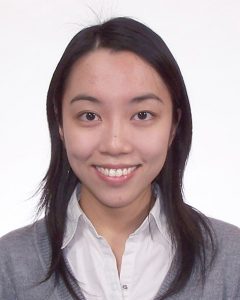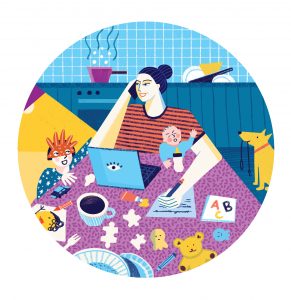A humbling experience
Allie Lee reports on adjusting to life away from the clinic as she attempts to juggle academic work with parenting

Allie Lee
Published: Friday, July 31, 2020
 Allie Lee, MD
Allie Lee, MD My husband and I are such an example. We have two children aged 11 months and 4 years. Closure of school and daycare meant that the delicate boundary between work, school and family life was undone overnight. Every day we woke up to make sure our boys were fed and intact, and to keep them out of mischief in the house. Young children are naturally inquisitive and curious, especially about tasks on your computer and things you say no to. They also crave parental company and always come up with random requests to be close to you. Their wishful little eyes see through your enduring guilt as a working parent, making it almost impossible to decline. Late night and before daybreak, in reality, are the only time for a protected home office, when my tiny new coworkers are asleep.
Since the pandemic put a stop to all schools in Hong Kong in January, I was granted a train of slashes – clinician/ junior academic/ crisis manager/ sanitation monitor/ homeschool teacher/ entertainment curator/ lunch caterer/ curriculum coordinator. My desktop was covered in yellow sticky notes of reminders and task lists. My mind was constantly consumed with plans and schedules to make sure everyone in the house was well taken care of. Busywork is not only draining, but also intrinsically incompatible with academic research, in which headspace and quietness are pivotal. Too much multitasking reduces one’s ability to focus. Too little time is left for thinking and writing scientific papers.
Traditionally, women have been the one to take on more household labour and child-rearing duties. They were disproportionately affected by the sharp increase in responsibilities mirroring the curve of coronavirus. Recent studies have shown evidence that, across disciplines, since the lockdowns began, female researchers were falling behind their male counterparts, posting fewer preprints and starting fewer new projects. The real effect will surface in the next few years as it takes time for peer review and for new projects to complete. On the other hand, this crisis might rise as an opportunity for those with fewer family duties to thrive. While extension of contracts and funding may mitigate the disparity due to COVID-19, a more accommodating and family-friendly culture in the academic community will truly make a difference in the long run.
In academia, a researcher’s number of key authorships in high-impact scientific journals and the ability to secure major funding for research work are the most important metrics for performance and determinants for career advancement. In plain English, papers and grants are the key. This system works in such a way that researchers with a longer track record are in a stronger position to win competitive grants, which in turn support more research output. This cycle propagates. For early-career academics, a period of loss in productivity means a loss in the opportunity to build the credentials they need to move up the academic ladder. Success at publication and funding is unpredictable and rejection is common. They may or may not be able to make up for the loss against the ticking tenure clock.
Early life in academia is a humbling experience. It is part rewarding and part challenging, especially in this extraordinary time of a century. Holding a baby in one hand and having a preschooler on the other while re-submitting a paper is distracting to say the least, but at the same time, surprisingly comforting and encouraging. We know that we are very lucky to have the job and the health we have now. The daily challenges we face are very real and can be overwhelming at times. Yet, like everything in life, this too shall pass.
Just keep going. Keep writing. Keep submitting.
Dr Allie Lee is Clinical Assistant Professor in Department of Ophthalmology, LKS Faculty of Medicine, in the University of Hong Kong
My husband and I are such an example. We have two children aged 11 months and 4 years. Closure of school and daycare meant that the delicate boundary between work, school and family life was undone overnight. Every day we woke up to make sure our boys were fed and intact, and to keep them out of mischief in the house. Young children are naturally inquisitive and curious, especially about tasks on your computer and things you say no to. They also crave parental company and always come up with random requests to be close to you. Their wishful little eyes see through your enduring guilt as a working parent, making it almost impossible to decline. Late night and before daybreak, in reality, are the only time for a protected home office, when my tiny new coworkers are asleep.
Since the pandemic put a stop to all schools in Hong Kong in January, I was granted a train of slashes – clinician/ junior academic/ crisis manager/ sanitation monitor/ homeschool teacher/ entertainment curator/ lunch caterer/ curriculum coordinator. My desktop was covered in yellow sticky notes of reminders and task lists. My mind was constantly consumed with plans and schedules to make sure everyone in the house was well taken care of. Busywork is not only draining, but also intrinsically incompatible with academic research, in which headspace and quietness are pivotal. Too much multitasking reduces one’s ability to focus. Too little time is left for thinking and writing scientific papers.
Traditionally, women have been the one to take on more household labour and child-rearing duties. They were disproportionately affected by the sharp increase in responsibilities mirroring the curve of coronavirus. Recent studies have shown evidence that, across disciplines, since the lockdowns began, female researchers were falling behind their male counterparts, posting fewer preprints and starting fewer new projects. The real effect will surface in the next few years as it takes time for peer review and for new projects to complete. On the other hand, this crisis might rise as an opportunity for those with fewer family duties to thrive. While extension of contracts and funding may mitigate the disparity due to COVID-19, a more accommodating and family-friendly culture in the academic community will truly make a difference in the long run.
In academia, a researcher’s number of key authorships in high-impact scientific journals and the ability to secure major funding for research work are the most important metrics for performance and determinants for career advancement. In plain English, papers and grants are the key. This system works in such a way that researchers with a longer track record are in a stronger position to win competitive grants, which in turn support more research output. This cycle propagates. For early-career academics, a period of loss in productivity means a loss in the opportunity to build the credentials they need to move up the academic ladder. Success at publication and funding is unpredictable and rejection is common. They may or may not be able to make up for the loss against the ticking tenure clock.
Early life in academia is a humbling experience. It is part rewarding and part challenging, especially in this extraordinary time of a century. Holding a baby in one hand and having a preschooler on the other while re-submitting a paper is distracting to say the least, but at the same time, surprisingly comforting and encouraging. We know that we are very lucky to have the job and the health we have now. The daily challenges we face are very real and can be overwhelming at times. Yet, like everything in life, this too shall pass.
Just keep going. Keep writing. Keep submitting.
Dr Allie Lee is Clinical Assistant Professor in Department of Ophthalmology, LKS Faculty of Medicine, in the University of Hong Kong
Latest Articles
Nutrition and the Eye: A Recipe for Success
A look at the evidence for tasty ways of lowering risks and improving ocular health.
New Award to Encourage Research into Sustainable Practices
Sharing a Vision for the Future
ESCRS leaders update Trieste conference on ESCRS initiatives.
Extending Depth of Satisfaction
The ESCRS Eye Journal Club discuss a new study reviewing the causes and management of dissatisfaction after implantation of an EDOF IOL.
Conventional Versus Laser-Assisted Cataract Surgery
Evidence favours conventional technique in most cases.
AI Scribing and Telephone Management
Automating note-taking and call centres could boost practice efficiency.
AI Analysis and the Cornea
A combination of better imaging and AI deep learning could significantly improve corneal imaging and diagnosis.
Cooking a Feast for the Eyes
A cookbook to promote ocular health through thoughtful and traditional cuisine.
Need to Know: Spherical Aberration
Part three of this series examines spherical aberration and its influence on higher-order aberrations.
Generating AI’s Potential
How generative AI impacts medicine, society, and the environment.